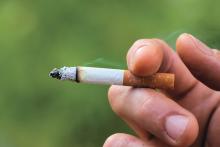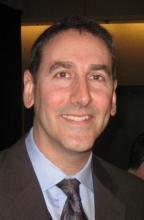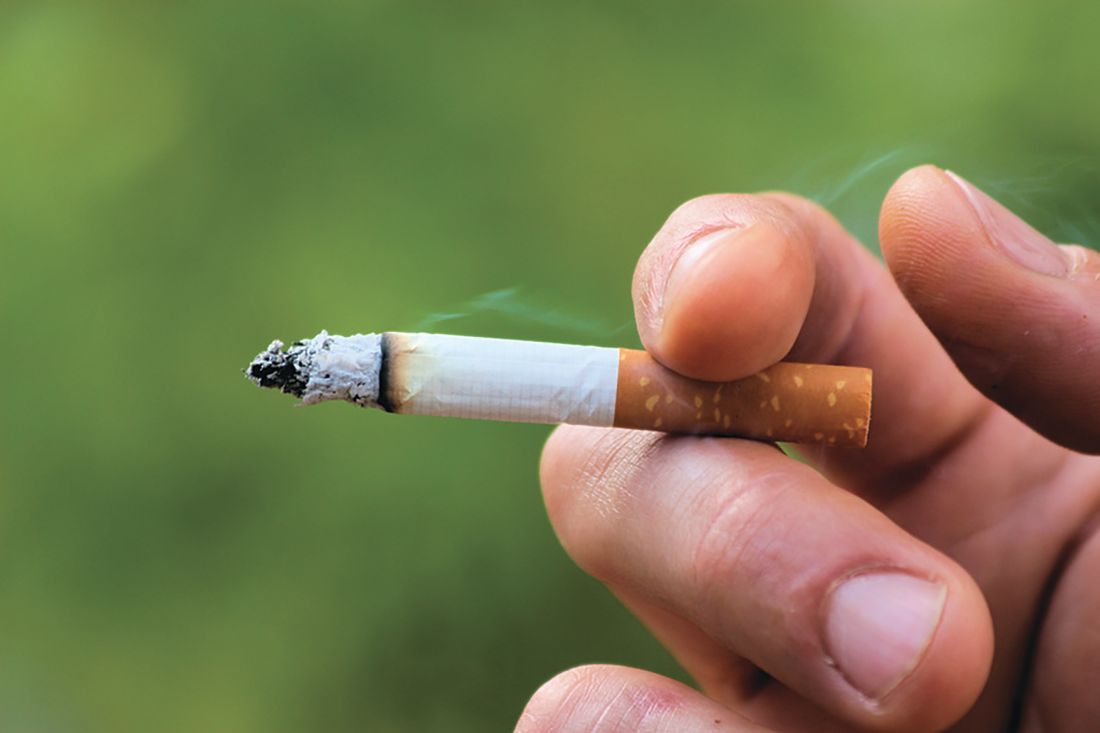User login
LAS VEGAS – Smoking cessation is mandatory before many hernia operations. Now, a surgeon is urging colleagues to examine the evidence and question whether this standard should still stand.
"Quality improvement is not a static process. It requires constant reassessment to make sure you’re doing a good job,” said Michael J. Rosen, MD, director of the Cleveland Clinic Comprehensive Hernia Center, in a presentation at the Annual Minimally Invasive Surgery Symposium by Global Academy for Medical Education.
It’s worth raising questions since much of the data regarding surgical risks “does not come from hernia patients,” he said. “It’s extrapolated from other surgeries and might not be applicable.”
Dr. Rosen was careful to tell the audience that he’s not an apologist for tobacco users. He listed the downsides of lighting up, including harms to pulmonary function, cardiovascular function, immune response, tissue healing,and hepatic metabolism of drugs. “I’m not crazy. I know that smoking is not healthy,” he said, “and I don’t work for a tobacco company.”
But do current smokers actually pay a price in terms of hernia repair complications? Dr. Rosen and his colleagues examined the question in a 2019 study that matched two groups of 418 ventral hernia repair patients (Surgery. 2019 Feb;165[2]:406-11).
They found no statically significant difference between current smokers and never-smokers in surgical site infections, surgical site occurrences requiring procedural intervention, reoperation, and 30-day morbidity. Seromas were more common in smokers, however (5.5% vs. 1.2%; P = .0005)
Two recent studies warned about risks in current smokers who undergo hernia operations. But, Dr. Rosen said, they actually revealed minimal differences in hernia outcomes between never-smokers and current smokers (Am J Surg. 2018 Sep;216[3]:471-4; Surg Endosc. 2017 Feb;31[2]:917-21).
Tobacco use as a risk factor for hernia complications “might not be as bad as we thought it was, at least for wound morbidity,” he said. “It might not be necessary to cancel the case” because of smoking habits, he said, adding that “you should question canceling folks.”
However, he said, amount of smoking and complexity of the operations still are important factors to consider.
In his presentation, Dr. Rosen questioned another common standard in hernia procedures: The use of postoperative epidurals in elective ventral hernia repair.
He coauthored a 2018 study that compared two matched groups of hernia patients – 763 who received epidurals and 763 who did not. Patients who received epidurals had longer length of stay (5 days vs. 4 days) and higher postop complications (26% vs. 21%; P less than .05; Ann Surg. 2018 May;26[5]:971-6). Epidurals also were linked to worse outcomes in a subset of high-risk pulmonary patients.
Factors such as high rate of improper placement, extra fluid received, and Foley catheter and thromboprophylaxis issues may explain the higher rates of problems in epidurals, he said.
According to Dr. Rosen, a study into an alternative treatment, transversus abdominis plane block, is underway.
Global Academy for Medical Education and this news organization are owned by the same parent company. Dr. Rosen disclosed having research support from Miromatrix, Intuitive, and Pacira, servicing as a board member for Ariste Medical, and serving as medical director for the Americas Hernia Society Quality Collaborative.
LAS VEGAS – Smoking cessation is mandatory before many hernia operations. Now, a surgeon is urging colleagues to examine the evidence and question whether this standard should still stand.
"Quality improvement is not a static process. It requires constant reassessment to make sure you’re doing a good job,” said Michael J. Rosen, MD, director of the Cleveland Clinic Comprehensive Hernia Center, in a presentation at the Annual Minimally Invasive Surgery Symposium by Global Academy for Medical Education.
It’s worth raising questions since much of the data regarding surgical risks “does not come from hernia patients,” he said. “It’s extrapolated from other surgeries and might not be applicable.”
Dr. Rosen was careful to tell the audience that he’s not an apologist for tobacco users. He listed the downsides of lighting up, including harms to pulmonary function, cardiovascular function, immune response, tissue healing,and hepatic metabolism of drugs. “I’m not crazy. I know that smoking is not healthy,” he said, “and I don’t work for a tobacco company.”
But do current smokers actually pay a price in terms of hernia repair complications? Dr. Rosen and his colleagues examined the question in a 2019 study that matched two groups of 418 ventral hernia repair patients (Surgery. 2019 Feb;165[2]:406-11).
They found no statically significant difference between current smokers and never-smokers in surgical site infections, surgical site occurrences requiring procedural intervention, reoperation, and 30-day morbidity. Seromas were more common in smokers, however (5.5% vs. 1.2%; P = .0005)
Two recent studies warned about risks in current smokers who undergo hernia operations. But, Dr. Rosen said, they actually revealed minimal differences in hernia outcomes between never-smokers and current smokers (Am J Surg. 2018 Sep;216[3]:471-4; Surg Endosc. 2017 Feb;31[2]:917-21).
Tobacco use as a risk factor for hernia complications “might not be as bad as we thought it was, at least for wound morbidity,” he said. “It might not be necessary to cancel the case” because of smoking habits, he said, adding that “you should question canceling folks.”
However, he said, amount of smoking and complexity of the operations still are important factors to consider.
In his presentation, Dr. Rosen questioned another common standard in hernia procedures: The use of postoperative epidurals in elective ventral hernia repair.
He coauthored a 2018 study that compared two matched groups of hernia patients – 763 who received epidurals and 763 who did not. Patients who received epidurals had longer length of stay (5 days vs. 4 days) and higher postop complications (26% vs. 21%; P less than .05; Ann Surg. 2018 May;26[5]:971-6). Epidurals also were linked to worse outcomes in a subset of high-risk pulmonary patients.
Factors such as high rate of improper placement, extra fluid received, and Foley catheter and thromboprophylaxis issues may explain the higher rates of problems in epidurals, he said.
According to Dr. Rosen, a study into an alternative treatment, transversus abdominis plane block, is underway.
Global Academy for Medical Education and this news organization are owned by the same parent company. Dr. Rosen disclosed having research support from Miromatrix, Intuitive, and Pacira, servicing as a board member for Ariste Medical, and serving as medical director for the Americas Hernia Society Quality Collaborative.
LAS VEGAS – Smoking cessation is mandatory before many hernia operations. Now, a surgeon is urging colleagues to examine the evidence and question whether this standard should still stand.
"Quality improvement is not a static process. It requires constant reassessment to make sure you’re doing a good job,” said Michael J. Rosen, MD, director of the Cleveland Clinic Comprehensive Hernia Center, in a presentation at the Annual Minimally Invasive Surgery Symposium by Global Academy for Medical Education.
It’s worth raising questions since much of the data regarding surgical risks “does not come from hernia patients,” he said. “It’s extrapolated from other surgeries and might not be applicable.”
Dr. Rosen was careful to tell the audience that he’s not an apologist for tobacco users. He listed the downsides of lighting up, including harms to pulmonary function, cardiovascular function, immune response, tissue healing,and hepatic metabolism of drugs. “I’m not crazy. I know that smoking is not healthy,” he said, “and I don’t work for a tobacco company.”
But do current smokers actually pay a price in terms of hernia repair complications? Dr. Rosen and his colleagues examined the question in a 2019 study that matched two groups of 418 ventral hernia repair patients (Surgery. 2019 Feb;165[2]:406-11).
They found no statically significant difference between current smokers and never-smokers in surgical site infections, surgical site occurrences requiring procedural intervention, reoperation, and 30-day morbidity. Seromas were more common in smokers, however (5.5% vs. 1.2%; P = .0005)
Two recent studies warned about risks in current smokers who undergo hernia operations. But, Dr. Rosen said, they actually revealed minimal differences in hernia outcomes between never-smokers and current smokers (Am J Surg. 2018 Sep;216[3]:471-4; Surg Endosc. 2017 Feb;31[2]:917-21).
Tobacco use as a risk factor for hernia complications “might not be as bad as we thought it was, at least for wound morbidity,” he said. “It might not be necessary to cancel the case” because of smoking habits, he said, adding that “you should question canceling folks.”
However, he said, amount of smoking and complexity of the operations still are important factors to consider.
In his presentation, Dr. Rosen questioned another common standard in hernia procedures: The use of postoperative epidurals in elective ventral hernia repair.
He coauthored a 2018 study that compared two matched groups of hernia patients – 763 who received epidurals and 763 who did not. Patients who received epidurals had longer length of stay (5 days vs. 4 days) and higher postop complications (26% vs. 21%; P less than .05; Ann Surg. 2018 May;26[5]:971-6). Epidurals also were linked to worse outcomes in a subset of high-risk pulmonary patients.
Factors such as high rate of improper placement, extra fluid received, and Foley catheter and thromboprophylaxis issues may explain the higher rates of problems in epidurals, he said.
According to Dr. Rosen, a study into an alternative treatment, transversus abdominis plane block, is underway.
Global Academy for Medical Education and this news organization are owned by the same parent company. Dr. Rosen disclosed having research support from Miromatrix, Intuitive, and Pacira, servicing as a board member for Ariste Medical, and serving as medical director for the Americas Hernia Society Quality Collaborative.
REPORTING FROM MISS


